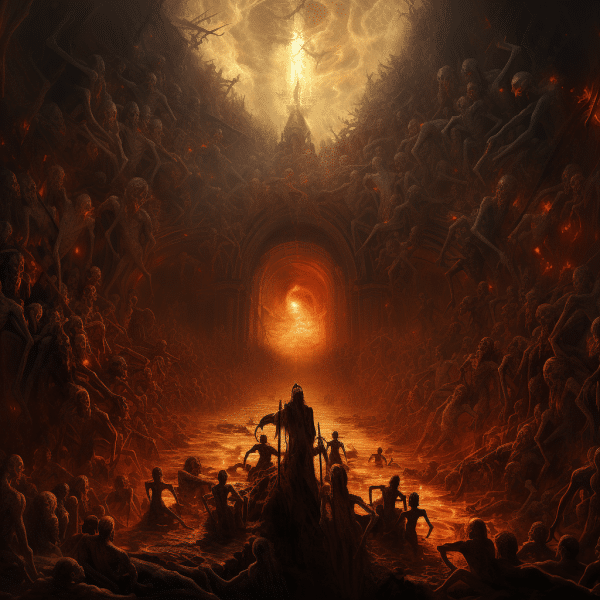
Exploring Hell, Redemption, and Near-Death Experiences

The notion of Hell has captivated and distressed people for generations, spurring critical questions about its purposes and pitfalls. Different religions have divergent understandings of this ultimate destination, such as Christianity’s vision of it as an eternal, fiery abode for those who have neglected salvation or Islam’s perception of a place of retribution for grievous sin. Hinduism and Buddhism also possess their own concepts of time-limited torment that one must traverse to reach spiritual enlightenment. It is fundamental to consider these various interpretations with sensitivity when contemplating the enigma of Hell.
Related: IS HELL REAL OR A METAPHOR?
The Eternal Nature of Hell and The Question of Escape
The concept of Hell has been a source of debate for centuries, raising the question: Is escape possible? However, other religious traditions provide varying perspectives. Buddhism and Hinduism, for instance, suggest escape from Hell via spiritual growth and reincarnation. Ultimately, one’s interpretation of the possibility of escaping eternal punishment depends on their individual beliefs. Thus, it is up to each of us to explore their faith and uncover answers to this timeless conundrum.
Christianity’s belief in Hell as an eternal separation from God
In Christian doctrine, Hell is a place of everlasting separation from God, an unimaginable destiny for those who reject His love and imperative salvation. As a warning, this teaching compels believers to accept grace, strive for sanctification, and embrace forgiveness. Interpretations of Hell vary amongst various denominations, yet the common thread is that one’s actions determine his destiny, and only repentance and acceptance of God’s redemption can bring reprieve. Regardless of one’s personal convictions, the truth remains that Hell is a reality that must be taken seriously.
Investigating Accounts of Near-death Experiences And Encounters with Hell
Near-death experiences (NDEs) are sometimes advanced as evidence of the afterlife, including Hell. These events involve people who have been temporarily declared clinically dead but were ultimately revived. Numerous NDE accounts commonly depict otherworldly realms, some of which resemble Hell.
Nevertheless, it is essential to approach such stories cautiously and objectively. Since NDEs are subjective experiences, they may be impacted by preconceived notions and religious indoctrination. In addition, skeptics argue that these episodes can be explained in physiological or psychological terms.
The reliability of NDEs is also debatable due to the lack of quantifiable data. Although anecdotal reports exist, the lack of scientific evidence renders it difficult to draw definite conclusions.
Moreover, it’s worth considering the cultural backdrop of such narratives when interpreting them. Different belief systems peg Hell as either a place of perpetual suffering or an allegorical state of separation from God.
Analyzing The Credibility and Interpretations of These Experiences
When attempting to assess the authenticity and validity of near-death experiences and purported encounters with Hell, it is prudent to exercise an unbiased attitude and a discerning eye.
Subjectivity, interpretation, psychological influences, cultural norms, and religious dogma all have the potential to affect one’s perception of Hell, as this realm is largely abstract and bereft of reliable physical proof. Therefore, assessing such phenomena requires careful scrutiny and an open yet reflective mindset.
Exploring The Concept of Hell Redemption and Forgiveness in Various Religious Teachings
Religious edicts from the likes of Christianity, Islam, and Buddhism all eulogize the prospect of redemption and atonement, delineating precise mandates to achieve such a coveted feat.
While the road map to salvation may vary across different traditions, the core notion remains constant – to find redemption and avoid damnation, one must embark on a path of genuine repentance and moral uprightness.
Does Forgiveness Extend to Those In Hell Redemption ?
God’s infinite mercy and grace offers all sincere reenters in Hell the potential for forgiveness, yet the precise implications remain a matter of interpretation. Depending on one’s religious beliefs, this may manifest as eternal separation from God or other outcomes. By approaching this question with an open and thoughtful mind, we can gain further insight into our own values and beliefs.

Can Personal Hell Redemption and Change of Heart Lead to Salvation?
Atonement and a transformation of one’s heart are essential tenets of many faith traditions when contemplating salvation and redemption. Christianity, for instance, prescribes that through a truthful penitence for transgressions and a heartfelt renewal, God will bestow His forgiveness and grace. Thus, followers must humbly accept their misdeeds, implore God for mercy, and dedicate themselves to living an upright life.
